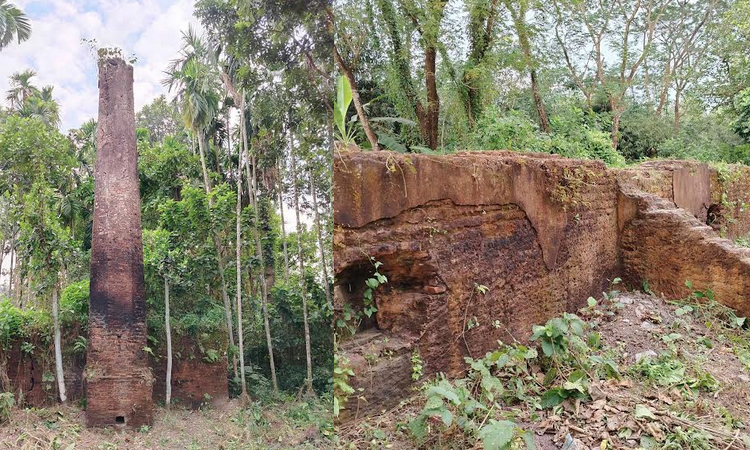News Flash

By Belal Rizvi
MADARIPUR, Oct 10, 2025 (BSS) - One of the many cruelties of British colonial rule in Bengal was the brutal oppression against indigo farmers. Across the country, the ruins of indigo factories still stand as silent witnesses to that dark period.
These factories, or neelkuthis, had separate rooms where farmers were tortured for refusing to cultivate indigo. One such historic site still stands in Madaripur Sadar upazila - a haunting reminder of that oppressive past. To today's generation, it represents a chapter of exploitation and resistance under British rule.
The site is located in Auliapur village under Chilarchar union of Madaripur Sadar upazila. A rural road branches off from the Shibchar-Madaripur regional highway leading to Auliapur. Near the local market lie the ruins of the indigo factory once run by a British overseer named Dunlop - known locally as "Dholok Saheb." Hence, the place is still referred to as Dunlop Saheb's Neelkuthi.
On-site observation reveals a long, twelve-room structure - an indigo manufacturing house with large concrete tanks once used to soak indigo leaves in water. Beside it stands a 40-foot-tall chimney, similar to those seen in modern brick kilns.
Locals say smoke emitted from it when the indigo was being processed. The chimney is now surrounded by weeds, and much of the factory lies in ruins. The twelve chambers across the main structure once served as the core of the indigo production unit, which reportedly occupied about 12 acres of land - though only a portion remains today.
Historical sources suggest that during British rule, indigo planters established an estate named "Neelkuthi" in Madaripur for indigo cultivation. Owing to the fertile soil, Auliapur in Chilarchar union became a major center for indigo farming. It is believed the factory was built before 1800. An Englishman named Dunlop managed the estate. Around 1847-48, local farmers, having suffered losses from indigo farming, began refusing to grow the crop - prompting the planters to unleash brutal punishments.
The factory once stretched from Auliapur village to the banks of the Chilarchar River, about 12 kilometers from Madaripur town. Although most of it has now blended into the soil, the surviving remnants still bear witness to the torture endured by farmers during the colonial period.
Locals say people often visit the ruins-school groups come for picnics, and sometimes even foreign visitors appear. Elderly villagers regard the place as cursed, yet all agree it remains a living monument to history. Adjacent to the Neelkuthi lies the shrine of the revered saint Hazrat Shah Sufi Khwaja Yusuf Shah Ahsan, which has also fallen into neglect and disrepair.
According to historical records, when the farmers of this region could no longer bear the British planters' cruelty, Haji Shariatullah (R.A.), founder of the Faraizi Movement, and his son Pir Mohsin Uddin Dudu Miah (R.A.) rose in rebellion. The movement spread rapidly across Faridpur, Dhaka, Mymensingh, Barishal, Cumilla, Noakhali, and other regions, uniting thousands against the tyranny. They could not accept the brutal torture inflicted upon the indigo farmers. The main objective of Haji Shariatullah (R.) in the Indigo Rebellion was to protect the farmers from the oppression of the British and the landlords. After his death, his son, Pir Mohsin Uddin Dudu Miah (R.), led a direct fight against the indigo planters. Their uprising drove the indigo planters from the region, freeing the farmers from oppression.
Auliapur resident Md. Mokbul said, "Englishman Dholok Saheb built this factory on 12 acres of land. Indigo was cultivated and processed here. Now only a part remains, but many people still come to see it. My grandfather told me there were once seven such factories, and this was the largest. Dholok Saheb lived here himself. This place stands as a witness to British history. Ancestors of our village suffered terribly under forced indigo cultivation."
According to historical sources, indigo cultivation was first introduced to the Indian subcontinent around 1777 by a Frenchman named Louis Bonnaud. By 1830, over a thousand indigo factories had been established across Bengal. Farmers were forced to grow indigo on their own lands instead of food crops. The Neelkuthi of Auliapur in Madaripur remains one such remnant of that exploitation.
Today, the nearly extinct Dunlop Saheb's Neelkuthi stands bordered by Ronkhola to the east, Auliapur Bazaar to the west, Kalitala to the north, and the Auliapur Dargah Sharif to the south. It was at Ronkhola that local farmers fought and defeated the indigo planters, winning their freedom. The 12-roomed structure still contains a central furnace used for indigo processing, beside which stands the tall chimney.
Madaripur Sadar Upazila Nirbahi Officer Wadia Shabab said, "Necessary steps will be taken to preserve the site. It is an important historical landmark."